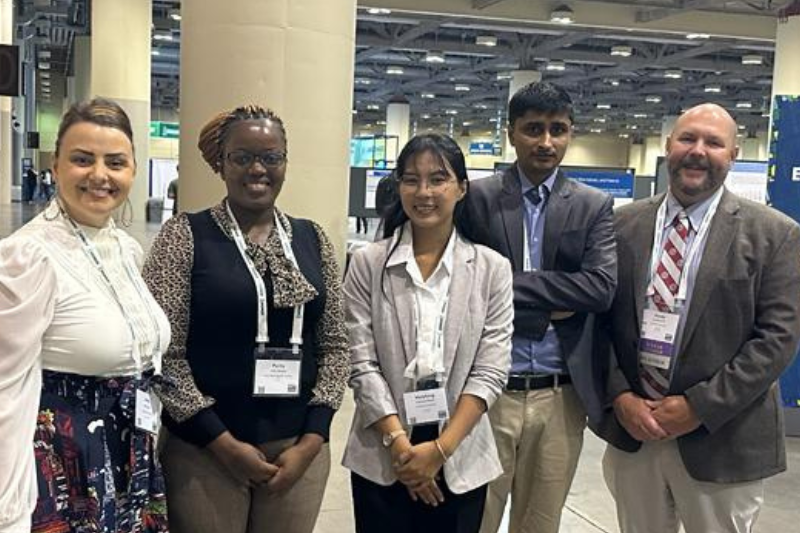
For graduate students specializing in food safety, their thesis work typically revolves around a specific product, value chain or pathogen. Attending international conferences is a valuable way for young scholars to gain a more comprehensive understanding of global food safety challenges and explore cutting-edge approaches. To provide this opportunity for international students working on FSIL projects, FSIL sponsored students from Cambodia, Nepal and Kenya to attend the 2023 annual International Association for Food Protection (IAFP) conference in Toronto, Canada, from July 16-19.
The meeting, which attracted more than 3,200 of the top industry, academic and governmental food safety professionals from six continents, was an opportunity for the students to attend research talks and establish connections with fellow researchers and industry representatives. The FSIL-sponsored students in attendance included Purity Njoki, a graduate student at Kenya Medical Research Institute (KEMRI); Purushottam Dhungana, from Pokhara, Nepal, currently pursuing a master’s degree in agriculture with a concentration in agribusiness at Tennessee State University; and Chhoeun Malyheng, a master’s student at the Royal University of Agriculture in Phnom Pehn, Cambodia.
“It was a true pleasure to meet the graduate students funded by FSIL,” said Randy Worobo, associate director of FSIL and professor of food science at Cornell University. “Their enthusiasm to absorb as much food safety research as possible at IAFP and the pride they had exhibiting their research at the most renowned food safety meeting was impressive.”
Dhungana, who is interested in applied economics fields such as behavioral economics, experimental economics and international development, is involved in an FSIL project in Nepal focused on the food safety economics of fresh produce. He credited the experience with giving him a broader understanding of the major food safety
challenges, priorities and policies across different regions of the world and perspective on how to prioritize research ideas to address food safety challenges.
“The IAFP conference was great exposure for me,” said Dhungana. “I got to meet people from diverse backgrounds — academia, industry, government, intergovernmental organizations and, more importantly, from different parts of the world. I learned about different approaches to food safety risk assessment, methodologies for estimating the cost of foodborne illnesses and the utilization of machine learning models and artificial intelligence in predicting food product quality — areas that align with my interest and long-standing areas of curiosity.”
Njoki is involved with a project called Chakula Salama, which is working to strengthen food safety on smallholder poultry farms in Kenya. She particularly enjoyed the chance to interact with students from all over the world working on food safety-related projects.
“I also got a chance to learn new field and lab methods of isolating Campylobacter and Salmonella, which are the key organisms that I am working on,” she said. “Traveling to Canada also changed my way of thinking and my approach to different things. I also improved my presentation skills through learning from the IAFP presenters, which gave me new ideas on what to do for my master’s degree.”
For Chhoeun, who has worked on produce safety in Cambodia, IAFP was her first international conference outside her home country. She seized the opportunity to learn about the latest technologies and connect with others dedicated to strengthening food safety.
“This conference allowed me to truly strengthen my professional skills,” Chhoeun said. “During the poster presentations, I had an opportunity to talk with researchers person-to-person about their projects, and these experiences have helped me to think more critically as well as enhanced my skillset with new perspectives and knowledge.”
Haley Oliver, FSIL director, professor of food science and assistant dean of agriculture online programs at Purdue University, noted that graduate students make significant contributions to FSIL projects, and the decision to support their attendance at the conference is part of a long-term strategy to strengthen global research capacity.
“By supporting their professional development, we can build a brighter future for food safety,” she said. “At the IAFP conference, they had the opportunity to learn the latest in cutting-edge food safety technology and practices, experience the depth and breadth of global food safety research, and network with researchers and private companies. It was a pleasure to meet these young scholars in person and witness their passion for building safer food systems.”
Christina Frank is a freelance writer with the Feed the Future Innovation Lab for Food Safety (FSIL). The lab is one of more than 20 Innovation Labs with U.S. universities under Feed the Future, the U.S. government’s global hunger and food security initiative led by USAID.

